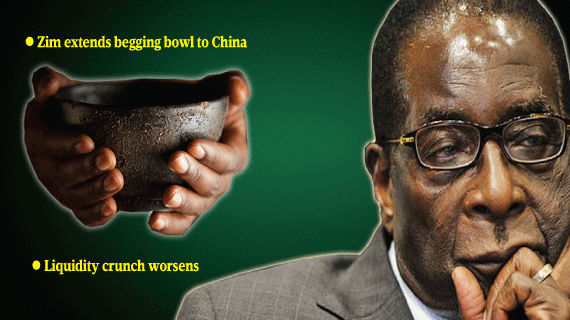
ZIMBABWE’S economy is in a renewed tail-spin likely to be reminiscent of the 2006-2007 pre-coalition government unless the new President Robert Mugabe administration urgently conjures up miraculous measures to salvage the economy.
GAMMA MUDARIKIRI OWN CORRESPONDENT
With the new government having surpassed the 100 days since Mugabe and his Zanu PF romped to victory, analysts point out that they have not come up with strategies and measures that have inspired confidence in the economy as potential investors, particularly white knights eager to embrace the new political dispensation, continue to sit on the fence.
The tail-spin has hit most companies with a majority reeling from the effects of the present severe liquidity crunch which has in turn seen most companies down-sizing.
Banks have also been hit with a number running out of cash and most firms in the manufacturing sector listed in critical condition.
“The economy is going down, we passed stagnation some months back and the economy is now shrinking,” said economic analysts John Robertson.
“We are losing jobs and an exports due to depressed industry performance and this is all evidence that the economy is going down,” he added.
Robertson said the country was urgently in need of financial assistance to save the economy although he said this was dependent on the government changing policies to create an investor- friendly environment, adding that the indigenisation law, for example, should be removed from the statute books, saying it was slowing down investment.
- Chamisa under fire over US$120K donation
- Mavhunga puts DeMbare into Chibuku quarterfinals
- Pension funds bet on Cabora Bassa oilfields
- Councils defy govt fire tender directive
Keep Reading
Information gathered by Southern Eye last week indicated that Finance minister Patrick Chinamasa was scheduled to visit China this month-end to seal a $10 billion financial rescue package for Zimbabwe that Zanu PF believes will kick-start the economy.
The country is said to have mortgaged its mineral resources, particularly Chiadzwa Diamond fields, as part of the deal to secure $10 billion deal from China, but analysts say even if the loan was secured, economic revival would be dependent of how the money would be used and the terms and conditions attached to the financial aid.
Robertson said: “Even if the country is given the $10 billion, economic revival would be dependent on how the money would be used. We need also to look at what the Chinese will demand in providing the loan. That way we can make an informed assessment,” he added.
MDC-T leader Morgan Tsvangirai’s economic advisor Eddie Cross said the banking sector was heading into a crisis unless something is urgently done, adding that government should increase foreign ownership of banks than reducing it through the indigenisation policy.
“We are heading for a fully blown financial crisis unless the government allows increased foreign ownership of banks to stabilise the sector,” said Cross.
He said the government needed urgent solutions to salvage the economy, adding that the recently-launched Zanu PF economic blueprint — the Zimbabwe Agenda for Socioeconomic Transformation (Zim Asset) — would not bring much of the desired outcome as the government had always faced challenges in implementing economic policies.
According to the Zanu PF-led government, Zim Asset will stabilise the economy and encourage economic growth.
But critics say while Zanu PF has lofty ambitions to grow Zimbabwe’s moribund economy by an average 7,3% between now and 2018, it would be a tall order unless there are modifications in policies especially the indigenisation law.
Zanu PF in its election campaign had promised stabilising the economy through attracting investment and creating two million jobs.
But Labour and Economic Development Research Institute of Zimbabwe director Godfrey Kanyenze said there was a huge gap between what the Zanu PF government had promised and what it had achieved so far.
“At policy level, the government has not implemented much of what it promised and the country is entrenching into deep poverty structurally,” said Kanyenze.
“We are going toward the informalisation of the economy as the majority are now employed by the informal sector,” he added.
Kanyenze said the rebound of the economy which the country recorded in 2009 was driven by the mining sector and that growth had been moderated owing to the plummeting international prices of minerals hence the economy was comatose.










